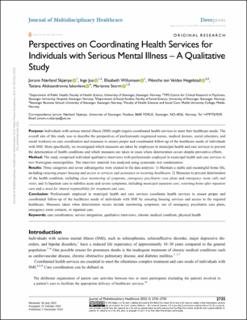| dc.contributor.author | Skjærpe, Jorunn Nærland | |
| dc.contributor.author | Joa, Inge | |
| dc.contributor.author | Willumsen, Anna Elisabeth | |
| dc.contributor.author | ten Velden Hegelstad, Wenche | |
| dc.contributor.author | Iakovleva, Tatiana Aleksandrovna | |
| dc.contributor.author | Storm, Marianne | |
| dc.date.accessioned | 2023-01-23T13:46:51Z | |
| dc.date.available | 2023-01-23T13:46:51Z | |
| dc.date.created | 2022-10-27T12:04:20Z | |
| dc.date.issued | 2022 | |
| dc.identifier.citation | Journal of Multidisciplinary Healthcare. 2022, 15, 2735-2750. | en_US |
| dc.identifier.issn | 1178-2390 | |
| dc.identifier.uri | https://hdl.handle.net/11250/3045405 | |
| dc.description.abstract | Purpose: Individuals with serious mental illness (SMI) might require coordinated health services to meet their healthcare needs. The overall aim of this study was to describe the perspectives of professionals (registered nurses, medical doctors, social educators, and social workers) on care coordination and measures to ensure proper and coordinated follow-up of the healthcare needs of individuals with SMI. More specifically, we investigated which measures are taken by employees in municipal health and care services to prevent the deterioration of health conditions and which measures are taken in cases where deterioration occurs despite preventive efforts.
Method: The study comprised individual qualitative interviews with professionals employed in municipal health and care services in two Norwegian municipalities. The interview material was analyzed using systematic text condensation.
Results: Three categories and seven subcategories were created in the data analysis: 1) Maintain a stable and meaningful home life, including ensuring proper housing and access to services and assistance in receiving healthcare; 2) Measures to prevent deterioration of the health condition, including close monitoring of symptoms, emergency psychiatric care plans and emergency room calls and visits; and 3) Inpatient care to stabilize acute and severe symptoms, including municipal inpatient care, returning home after inpatient care and a need for shared responsibility for treatment and care.
Conclusion: Professionals employed in municipal health and care services coordinate health services to ensure proper and coordinated follow-up of the healthcare needs of individuals with SMI by ensuring housing services and access to the required healthcare. Measures taken when deterioration occurs include monitoring symptoms, use of emergency psychiatric care plans, emergency room contacts, or inpatient care.
Keywords: care coordination, service integration, qualitative interviews, chronic medical condition, physical health | en_US |
| dc.language.iso | eng | en_US |
| dc.rights | Navngivelse-Ikkekommersiell 4.0 Internasjonal | * |
| dc.rights.uri | http://creativecommons.org/licenses/by-nc/4.0/deed.no | * |
| dc.title | Perspectives on coordinating health services for individuals with serious mental illness : a qualitative study | en_US |
| dc.type | Peer reviewed | en_US |
| dc.type | Journal article | en_US |
| dc.description.version | publishedVersion | en_US |
| dc.source.pagenumber | 2735-2750 | en_US |
| dc.source.volume | 15 | en_US |
| dc.source.journal | Journal of Multidisciplinary Healthcare | en_US |
| dc.identifier.doi | 10.2147/JMDH.S384072 | |
| dc.identifier.cristin | 2065584 | |
| dc.relation.project | Universitetet i Stavanger: IN-11551 | en_US |
| cristin.ispublished | true | |
| cristin.fulltext | original | |
| cristin.qualitycode | 1 | |

